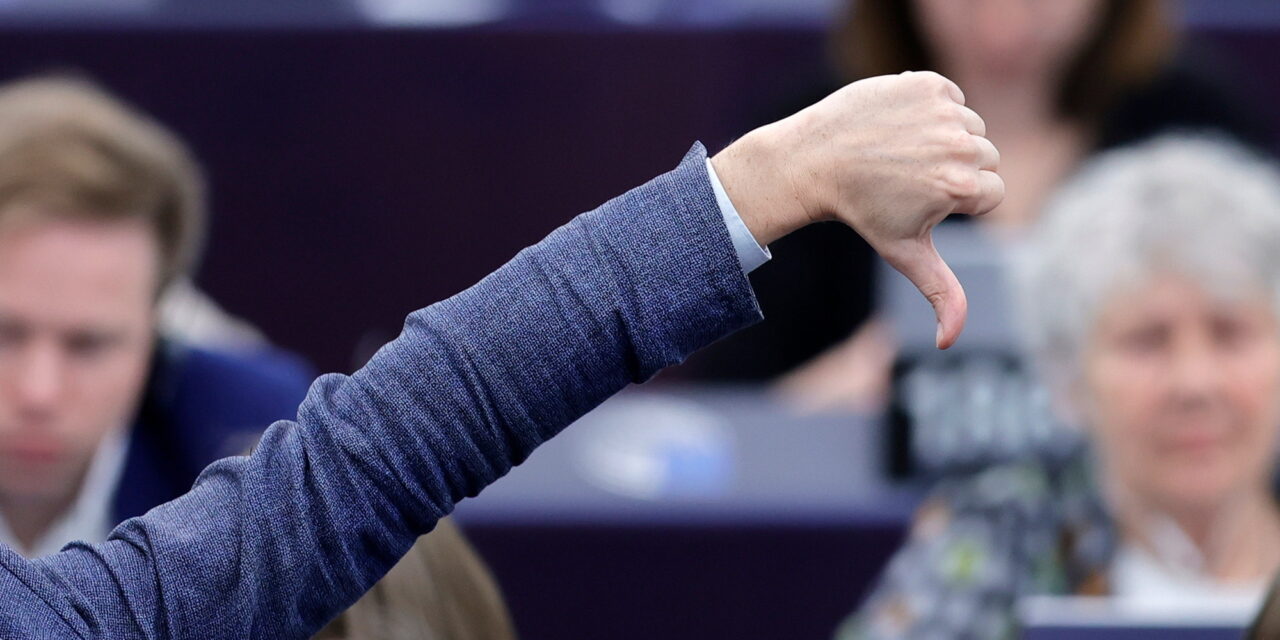The real change occurred in the group of non-committals (this group currently includes Fidesz with ten representatives), which increased by 35 representatives compared to the previous ones.
The Poll of Pols, Politico's organization summarizing public opinion polls, already predicted the expected result weeks before the EU elections, and the actual data very well confirmed the preliminary expectations. For the largest factions, the difference was no more than ten representatives, but what one mainstream party lost was won by the other, thus the People's Party (EPP) received 189 seats instead of the predicted 174, and the Socialists (S&D) got 135 instead of the predicted 144. instead of and the Renewal of Europe faction (Renew) 79 instead of the preliminary 85. But if we add these representatives of the parties that make up a large globalist coalition, it means 403 representatives, exactly as many as were in the forecast. At the same time, these factions collectively lost a total of six seats compared to the previous cycle, which does not represent a significant change compared to the past, since a parliamentary majority to decide an issue requires 361 votes, which is still plenty, especially if we include the Greens 53 and the left with 36 representatives.
The conservative or right-wing, i.e. Conservatives and Reformists (ECR) and Identity and Democracy (ID) actually increased their votes, with a total of 13 seats, but they still only have 131 seats. The two big and deserved losers of the elections were the Renewal of Europe faction with 23 and the Greens losing 18.
The real change occurred in the group of non-committals (currently including Fidesz with ten representatives), this camp increased by 35 representatives compared to the previous ones, and if we count the old and the new (those who have just entered the parliament for the first time), 97 representatives they have, and the real big stakes in the upcoming faction renewal negotiations is where these representatives will end up.
According to paper form, the former factions will be reinstated, so the ECR and the ID form a group each, and they would also welcome the currently independent Fidesz representatives into one of them. The German AfD, which was expelled from the ID at the initiative of Marine Le Pen, will either remain independent, or it will manage to find eight more representatives from six countries from the large camp of independent representatives to form another right-wing faction.
In this case, there would be three right-wing factions that could perhaps create an alliance, the same as the People's Party formed with the Socialists and Liberals in previous cycles, and will form in the new cycle as well.
However, in terms of increasing parliamentary influence and obtaining leading positions, it would be much more effective if the leaders of the parties with the most representatives could agree in a single, large faction. If Marine Le Pen, Giorgia Meloni, Jarosław Kaczyński, Viktor Orbán and Matteo Salvini were able to find a construction in which all parties that reject Brussels' centralization efforts, illegal immigration, gender propaganda and return to Europe's traditional values could fit in, then such a large faction could also be created, which would surpass the 189 representatives of the current People's Party faction.
In this area, the biggest problem to be solved is the possible return of the AfD, which has 15 representatives and was expelled from the ID group in April at the initiative of Le Pen.
The exclusion of the AfD took place because one of their representatives, the head of the EU list, Maximilian Krah, said in an interview with the Italian daily La Repubblica that not all members of the Nazi SS were criminals. This statement caused a great international outrage, and Le Pen, who even expelled the father of the party's founder from the party in order to make her party acceptable (for his anti-Semitic comments), declared that she did not want to be in a faction with the AfD. Since he had 22 representatives in the ID faction, the AfD had only 11, and the AfD had to leave the group.
Even if the exclusion was understandable before the elections, the AfD's group, which has now grown to 15 representatives, will be needed to establish a large faction. La Repubblica writes that after France, the taboo of cooperation with extremist forces may also collapse in Germany, because the European Parliament and local elections have shaken the wall against the AfD in many areas, and there may be areas where it is not even possible to govern without the AfD. The opinion of the AfD is therefore also changing in Germany, it would be a great luxury if the right wing in the European Parliament ignored this change.
In addition, Krah may even have been right, because even though the entire SS was classified as a criminal organization in Nuremberg, some of them did not join the organization voluntarily, but by conscription, and it is not certain that they participated in the killing of civilians. The leaders responsible for Nazi crimes were punished in Nuremberg, declaring entire organizations or groups of people collectively guilty is not considered a lucky thing, historical examples could be given.
The mainstream media and parties, in their effort to prevent a more powerful right-wing coalition, are even trying to find a hold on some people by using secret service tools, for example one of Krah's colleagues was accused of being a Chinese spy, and that person is really of Chinese origin and thus has Chinese connections . Now that there is, at least in principle, the possibility of creating a larger, more influential right-wing faction, politicians wishing to form a faction have to count on even greater media pressure. The mainstream media will obviously do everything to pit politicians with a larger number of representatives against each other, to label certain parties or individuals as untenable. On the part of the mainstream, this does not only concern the AfD or right-wing parties in general, nor is it only a European matter. Right now we can see that the most incompetent accusations are being brought against the former American president, Donald Trump, and they even want to put him in prison, just to prevent his re-election as president. The slander against the former president is not new either, it already happened on the political stage, and when he first appeared, he was described with all the epithets of the mainstream intended for his opponents, such as racist, xenophobic, homophobic, sexist, and the anti-Semitic epithet could not be left out either.
This is what awaits the leaders of the right-wing parties in the near future, and if they cannot resist this pressure for division, they will lose the influence they would gain by creating a big one. As the next EU election is five years away, attacks can only affect domestic positions. At the same time, in my opinion, this can also be prevented if the political public discourse could be diverted from the anti-Semitic topic to the economic bankruptcy caused by the left-liberal EU and nation-state governments, which the statistical data shows clearly and comprehensibly for everyone, even if someone did not feel it directly on their own skin. The think tanks supporting the right-wing alternative could provide great help in this area. One such already exists, the Mathias Corvinus Collegium (MCC) with Hungarian connections, whose last conference in Brussels already questioned the irrational climate policy of the union, which was then also taken up by the mainstream media.
However, a real turnaround can only be achieved with one's own network of media and knowledge centers, and the large faction is needed precisely so that the material and political conditions for this can be created.
Author: Károly Lóránt, economist, advisor to the National Forum
Source: Magyar Hírlap
Cover image: MTI/EPA/Ronald Wittek













